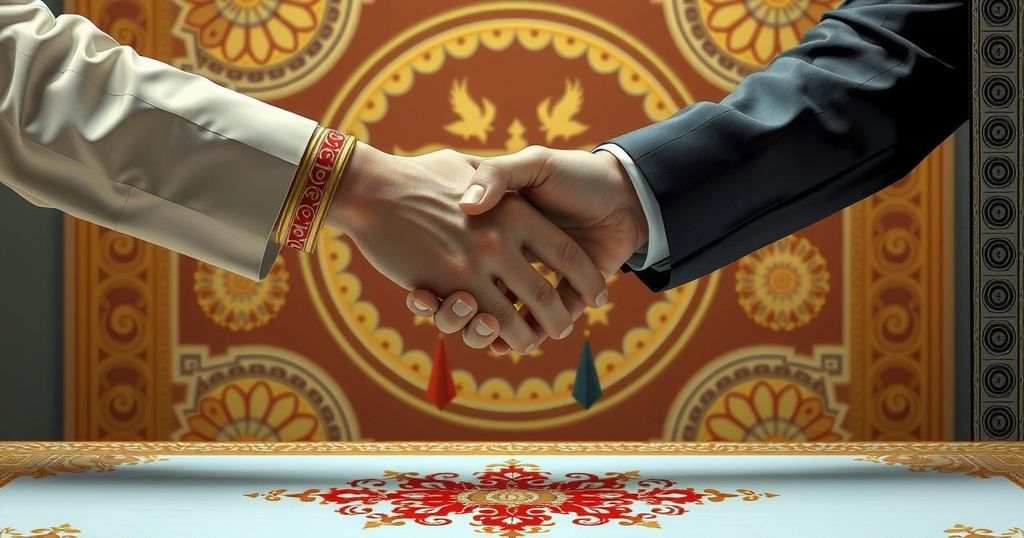Diplomatic Engagements Amid Tensions: The Emirati Diplomat Meets Iran’s Foreign Minister

An Emirati diplomat met with Iran’s Foreign Minister to discuss a letter from President Trump regarding Iran’s nuclear program. Supreme Leader Khamenei criticized the letter and expressed disdain for negotiations with the U.S. amid ongoing economic challenges and increased nuclear activity. The geopolitical tensions involving the U.S. and Israel juxtaposed against Iran’s internal struggles signify a critical juncture in international relations.
An Emirati diplomat, identified by Tehran as holding a letter from U.S. President Donald Trump, met with Iran’s Foreign Minister, Abbas Araghchi, in a recent unannounced visit to Tehran. This letter aims to initiate discussions regarding Iran’s advancing nuclear program. The response from Iran remains uncertain, particularly as Supreme Leader Ayatollah Ali Khamenei has expressed disinterest in negotiations with the U.S., labeling it a ‘bullying government.’
Despite Khamenei’s skepticism, Iran grapples with significant economic challenges worsened by U.S. and Western sanctions imposed since President Trump took office. The pressure on Iran, coupled with internal strife and recent military actions from Israel, has placed the nation in a vulnerable position, possibly unprecedented since the 1979 Islamic Revolution. Khamenei remarked that threats of military action from America are irrational, asserting that Iran is capable of retaliating effectively.
The meeting’s abrupt occurrence featured Emirati official Anwar Gargash, though the specifics surrounding the letter were not disclosed during the brief footage aired. The UAE’s relationship with the United States remains strong, aligning with the incumbent Emirati government’s interests. Therefore, Gargash’s visit during Ramadan went largely unrecognized by the UAE government shortly thereafter.
In a past television interview, President Trump indicated he had written to Khamenei, expressing hopes for negotiation and warning of potential military action if diplomacy fails. Trump’s lack of specific proposals in the letter raises questions about its potential efficacy. This gesture mirrors his prior communications with Kim Jong Un, which, despite promising beginnings, did not culminate in substantial agreements regarding North Korea’s nuclear ambitions.
During a recent address, Khamenei criticized Trump’s letter, characterizing it as a ploy to mislead global public opinion. He remarked that engaging in negotiations with someone who dismissed prior agreements would be futile and noted that, if desired, Iran could pursue nuclear weaponry regardless of American opposition.
Concurrently, Israeli and U.S. officials have reiterated their stance against Iran obtaining nuclear weapons, further escalating concerns of military conflict as Iran enriches uranium close to weapons-grade levels. While Iran maintains that its nuclear program serves peaceful purposes, internal and external tensions escalate as Israel and Iran engage in direct confrontations during the ongoing conflicts in the region.
Since the inception of his presidency, Trump’s administration has positioned itself against Iran’s nuclear development, demanding measures to avert its capability of developing nuclear arms. His first term notably strained U.S.-Iran relations, particularly after the withdrawal from the nuclear deal in 2018 and subsequent sanctions that severely impacted Iran’s economy. The extent of Iran’s response to continuous pressure remains ambiguous, especially as its socio-economic conditions deteriorate amidst ongoing protests and civil disobedience against repressive laws.
In summary, the interaction between the Emirati diplomat and Iran’s Foreign Minister highlights the diplomatic complexities surrounding Iran’s nuclear ambitions. While Supreme Leader Khamenei has shown resistance to dialogue with the U.S., economic pressures may challenge this stance. The implications of Trump’s letter remain uncertain, yet they indicate a significant moment in U.S.-Iran relations as tensions continue to escalate in the region, particularly with Israel. Overall, the situation reflects a precarious balance between diplomacy and potential conflict amidst rising global concerns over nuclear proliferation.
Original Source: www.nsnews.com








